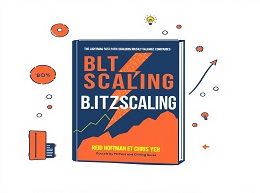Scaling Lean

Scaling Lean: Mastering the Art of Startup Growth and Success - A Comprehensive Review
"Scaling Lean: Mastering the Key Metrics for Startup Growth" by Ash Maurya is a must-read for entrepreneurs seeking to scale their businesses efficiently and effectively. Building on the principles from his previous book, "Running Lean," Maurya provides a structured and systematic approach to scaling startups by focusing on actionable metrics and validated learning. This review will delve into the book’s key concepts, illustrate them with engaging examples, and discuss the broader implications for entrepreneurs aiming for sustainable growth.
The Challenge of Scaling
Scaling a startup is one of the most challenging phases in the entrepreneurial journey. It requires balancing rapid growth with operational efficiency while avoiding the pitfalls that can derail progress. "Scaling Lean" addresses these challenges by offering a strategic framework that helps entrepreneurs measure, manage, and maximize growth.
The Lean Scaleup Framework
At the core of "Scaling Lean" is the Lean Scaleup Framework, which is designed to guide startups through the scaling process systematically. This framework consists of three key stages:
1. Modeling : Creating a model of your business to identify key assumptions and metrics.
2. Measuring : Tracking progress against these metrics to validate assumptions.
3. Managing : Iterating and optimizing based on validated learning.
Modeling: Creating a Business Model Blueprint
The first step in the Lean Scaleup Framework is to create a business model blueprint. This involves identifying the key drivers of your business and the assumptions underlying them. Maurya introduces the concept of the Lean Canvas, a one-page business model that helps entrepreneurs quickly sketch out their ideas and identify potential risks.
Example: Dropbox
Dropbox, the cloud storage company, used a lean approach to model its business early on. By focusing on key metrics such as user acquisition and retention, Dropbox was able to identify the most effective channels for growth and refine its value proposition. This lean modeling helped Dropbox scale rapidly while minimizing wasted resources.
Measuring: Tracking Progress with Actionable Metrics
Once the business model blueprint is in place, the next step is to measure progress using actionable metrics. Maurya emphasizes the importance of focusing on metrics that matter those that directly impact your growth and sustainability.
Example: Airbnb
Airbnb used actionable metrics to track key aspects of its growth, such as the number of listings, bookings, and user engagement. By measuring these metrics, Airbnb was able to identify areas for improvement and optimize its platform to enhance user experience and drive growth. This data-driven approach was crucial in scaling Airbnb into a global marketplace.
Managing: Iterating and Optimizing for Growth
The final stage of the Lean Scaleup Framework is managing growth through iterative experimentation and optimization. This involves using the insights gained from measuring actionable metrics to make data-driven decisions and pivot or persevere as needed.
Example: Slack
Slack, the team collaboration tool, managed its growth by continuously iterating on its product based on user feedback and usage data. This iterative approach allowed Slack to rapidly improve its features, enhance user experience, and scale its user base efficiently. By managing growth through validated learning, Slack was able to achieve widespread adoption and market dominance.
Key Concepts in Scaling Lean
Maurya introduces several key concepts that underpin the Lean Scaleup Framework, each of which plays a crucial role in helping startups achieve sustainable growth.
The Traction Model
The traction model is a key concept in "Scaling Lean," emphasizing the importance of achieving and maintaining traction sustained growth driven by validated learning. This model helps entrepreneurs focus on the metrics that matter most and avoid the vanity metrics that can distract from true progress.
The Lean Plan
The Lean Plan is a dynamic and flexible approach to business planning that focuses on achieving short-term goals aligned with long-term vision. Unlike traditional business plans, which can become outdated quickly, the Lean Plan evolves based on real-world feedback and validated learning.
Innovation Accounting
Innovation accounting is a systematic approach to measuring and managing the progress of innovation efforts. It involves setting up experiments, tracking key metrics, and using the results to make informed decisions about whether to pivot, persevere, or scale.
Practical Strategies for Scaling
"Scaling Lean" provides numerous practical strategies that entrepreneurs can apply to scale their startups effectively.
Validate Before You Scale
One of the core principles of "Scaling Lean" is to validate your assumptions before scaling. This means conducting experiments and gathering data to ensure that your business model is viable and scalable.
Focus on Key Metrics
Focusing on key metrics that directly impact growth is crucial. Maurya advises entrepreneurs to identify and track the metrics that matter most to their business, such as customer acquisition cost (CAC), lifetime value (LTV), and churn rate.
Iterate and Optimize
Continuous iteration and optimization based on validated learning are essential for sustainable growth. This involves regularly reviewing your metrics, conducting experiments, and making data-driven decisions to improve your business model.
Common Pitfalls and How to Avoid Them
Maurya also addresses common pitfalls that startups face when scaling and provides strategies to avoid them.
Vanity Metrics
Vanity metrics, such as website traffic or social media likes, can be misleading and do not necessarily reflect true progress. Entrepreneurs should focus on actionable metrics that provide meaningful insights into their business performance.
Scaling Too Quickly
Scaling too quickly without validating key assumptions can lead to significant risks, including overcommitting resources and failing to meet customer demand. Entrepreneurs should ensure they have a solid foundation and validated business model before scaling.
Ignoring Customer Feedback
Customer feedback is invaluable for improving your product and business model. Ignoring this feedback can lead to missed opportunities and potential failure. Entrepreneurs should actively seek and incorporate customer feedback into their iteration process.
A Roadmap for Sustainable Growth
"Scaling Lean" offers a comprehensive and actionable framework for scaling startups. By focusing on modeling, measuring, and managing growth, entrepreneurs can achieve sustainable success while minimizing risks. The principles and strategies outlined in the book provide a valuable roadmap for any startup looking to scale efficiently and effectively.
Final Thoughts: Practical Takeaways for Entrepreneurs
For aspiring entrepreneurs, "Scaling Lean" provides practical guidance and actionable insights that can significantly enhance the chances of success.
Validate Your Assumptions
Before scaling, ensure that your key assumptions are validated through experiments and real-world data. This reduces the risk of scaling based on unproven ideas.
Focus on Metrics That Matter
Identify and track the metrics that directly impact your growth and sustainability. Avoid vanity metrics and prioritize actionable insights.
Embrace Continuous Learning
Adopt a mindset of continuous learning and iteration. Use customer feedback and data-driven insights to refine your business model and optimize for growth.
Plan Flexibly
Develop a Lean Plan that evolves based on validated learning. This dynamic approach allows you to adapt to changing circumstances and make informed decisions.
By applying these principles, entrepreneurs can navigate the complexities of scaling and achieve long-term success. "Scaling Lean" is an essential read for anyone involved in the startup ecosystem, offering timeless lessons and strategies for driving sustainable growth.













